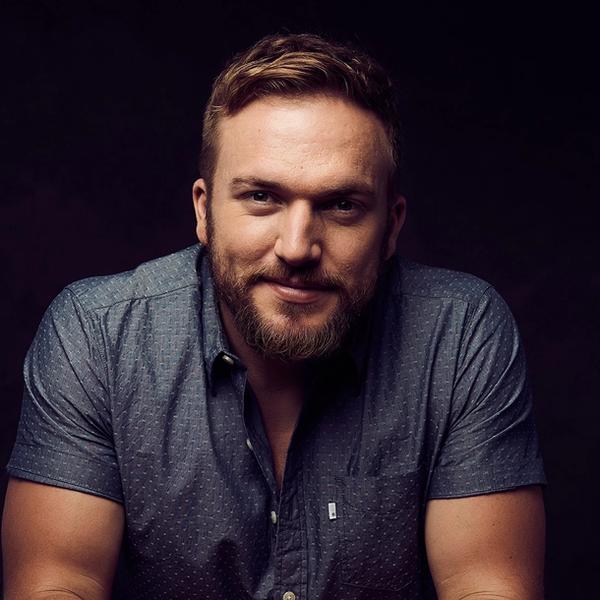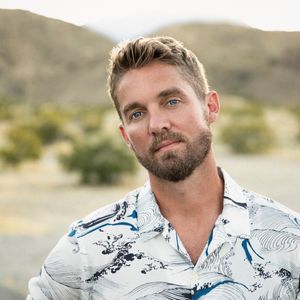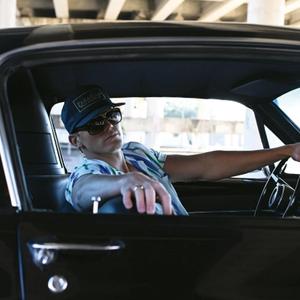




Link copied

On paper, you’d think that Logan Mize’s entry point into country music would have been through his family. His great uncle, Billy Mize, was a steel guitarist and musical pioneer - credited not only with helping to forge the Bakersfield Sound, but creating the ACM Awards; then a West Coast-centric country music awards show.
In fact, it wasn’t until after the younger Mize had already moved to Nashville to pursue a career in country music that one day, out of the blue, his legacy found him. Mize got a call inviting him to come play his great uncle’s 80th birthday party at Buck Owen’s Crystal Palace, a gig where he’d be opening for none other than Merle Haggard. He played that show and even met Billy himself, who 20 years earlier had suffered a stroke that left him unable to speak, yet still he managed to grab Mize’s hand after the show and squeak out, “You were good.”
It was an unforgettable moment for the young performer, who suddenly found an entire family legacy opened up to him that he’d never before known existed. As it turned out, Mize’s grandfather had even lived with Billy out in California for a while, but never thought to mention that piece of family history to his grandson.
But even before Mize learned the story of his legendary great uncle and began diving into the music of Buck Owens, Merle Haggard and the great performers of the Bakersfield Sound, he’d long ago made up his mind to pursue a life in music. Below, Mize shares the early inspirations that made him fall in love with music. He also discusses his journey from his home state of Kansas to Nashville and back again, and how that evolving relationship with Music City and his own hometown impacted his new album, Still That Kid.

The Bakersfield part of your legacy and your connection to Billy Mize wasn’t what first got you hooked on music. Who were some of the artists, and what were some of the sounds, that were?
I honestly was more into the heartland rock stuff. [John] Mellencamp, [Tom] Petty. I loved Elton John. Even Celtic music was a huge influence on me. My dad got me into Gordon Lightfoot, John Denver, Nitty Gritty Dirt Band - you know, hippie country. But there was no hardcore country. I think I discovered Waylon Jennings on my own, probably around late high school. I obviously got into Merle Haggard and Buck Owens later on, but it wasn’t something I initially moved to Nashville to do. I had so many pop and rock influences, with Mellencamp and Petty and Elton John -- but you know, the way country radio sounded in the late ‘90s, as far as I was concerned, Tim McGraw could’ve been in that category. And he was cutting great songs. So that’s how I ended up in Nashville trying to figure out what my sound was.
When you moved to Nashville, before you had a record deal, you signed a publishing deal. How did that influence your career?
I didn’t even know what a publishing deal was, to be honest. But I signed one probably within a year of being there. I was with a small company owned by Brett Jones. I learned a lot from him: I was pretty much holed up in a house over by Belmont, and wrote songs with Brett Jones for a year. Him and Dallas Davidson, Ben Hayslip and Rhett Akins - gosh, Randy Houser, Jamey Johnson, those guys were in and out of the house. [I remember] early days Luke Bryan, him pulling up in the yard and Brett yelling at him to use the driveway. It was pretty wild.
Did you want to be a recording artist, or were you pursuing a career as a songwriter at that time?
I wanted to be a recording artist, and man, ignorance is bliss. I didn’t realize how far I had to go, from the time I started until Brett began to get me to sing his songs that he wrote; he’d have me sing the demos. God bless the engineer that had to mess with my vocal! I just wasn’t used to hearing myself on tape, hearing myself back and having to sing on somebody else’s melodies. But it was really good, because it got me used to singing something I wasn’t familiar with. It became one of those things where I could go sing a demo for anybody and be pretty quick at it, pretty proficient. But it was a big learning curve at the beginning.
What was your favorite thing about Nashville back in those days?
Man, honestly, it was a dream. I got a job driving a dump truck in Hendersonville, so I would wake up at six and go drive from seven to four. At four o’clock I was off, and I’d have about an hour to go home, brush through a new song I’d written, change clothes and head down to any given writers’ night. Whether it was The Commodore or a place called Past Perfect on 3rd Street, it seemed like there was a never-ending tally of songwriters’ nights that you could just go to. Now it seems there aren’t as many, or they’re few and far between. You have The Listening Room, but there were 20 going on at one time in town. That was probably ‘06, I guess.
Did you really think at that time that it would take the prescribed ten years for you to “make it”?
No! I thought that was a ridiculous notion. Ten years seemed like an eternity to me. I was 21 years old. I was like, “I would be 31 by the time I get anything going - that’s ridiculous.” But by the time I got my first major record deal, I was 30, 30 or 31. I’ve been through a couple since then. But no, there was no telling me that it was a “ten year town”. I thought that was preposterous.
After 12 years, you decided to move back to your home state of Kansas, in large part because you had kids. Did that lifestyle shift impact your music, specifically on your new album, Still That Kid?
I think so. The first song I wrote for this album is called ‘American Livin’’, which is the first track. When we first moved back I didn’t have an office or anything, and we were living in my in-laws’ basement. My dad has been a butcher at my family’s grocery store since before I was born, and I used to go hang out in the back in the butcher shop. They had an office that they hadn’t used in 20 years, and it was above the butcher shop. So I asked, “Hey, what’s going on with that room? Would it be cool if I used it?”. I set up my recording gear, my guitars and keyboards and stuff, and that song fell out. It was like, this is being home, seeing people that I recognize and living a small-town, normal, average life. Whereas in Nashville, you feel like you’re constantly comparing yourself to who’s got more going on, or who’s who and what’s what. It just seemed like a rat race, a little bit. So that song started the trajectory for what became this collection.
‘Hometown’ seems to fit that theme, too. What’s the story behind writing that song?
I actually didn’t write that song! You know, there was a period of my life where I thought I had to write everything. But I started to really love being able to take someone else’s song and make it my story. The next thing you know, I’m scouting songs all over the place, and people are sending me songs. [‘Hometown’] was one I listened to - I remember it was summertime when I first got pitched the song. I listened to it on the boat out on the lake, probably every time we were out there. I just loved it. Stephen Wilson did a great job with it – him, Marv Green and Tony Lane. I’m a huge fan of all those guys.
Where you are in your musical journey today, what’s your favorite part of Nashville now?
Really, the songwriting community is great; the players, the musicians - it’s just fun to be around those guys. There are all these separate parts that create this magic thing that you hear when a record comes out. The songwriting community, that’s the very early, raw stage, where a bunch of guys and gals sit around banging a bunch of wooden instruments. Then they put it down - maybe it’d be on an iPhone recorder now - but back in the day it was a digital recorder or tape recorder. It sounded pretty bad, but you could kind of find the melody. Then you’d go into the studio and the session guys would show up – you’d chart out the chord changes for them, and they’d turn this clunky song into this amazing-sounding work of art. I learnt to love all the songwriters that are just going for it, and the group of musicians that are turning these songs into magical recordings. I just love all the creative folks in Nashville.
Over the years, there’s been an increase in more pop-focused songwriters joining the Nashville community from other places, like L.A. or New York. Do you think that changes Nashville? Or at its heart, do you think it’s the same?
I’m sure there are a lot of people who don’t like change, who wanna say, “Oh, you know, John Prine didn’t write to a loop,” or whatever. I think it’s always been happening. Bob Dylan or Tom Petty, all those guys, if they were in the business right now they’d be in Nashville writing songs. It just evolves and changes, and I think that’s a good thing. I think at its heart, it’s still the same. People just have different avenues of getting to the same place, whether you start with a track on a computer or you start with a word written down on your iPhone, or scratched on a receipt. Whatever! In the end, you’re still just trying to get a good song.
Still That Kid is out now via Big Yellow Dog Music. Watch the video for 'Grew Apart', featuring Donovan Woods, below.
Photography courtesy of Big Yellow Dog Music




